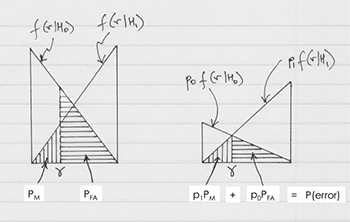In this section, Professor Verghese describes the rationale for offering students three grading schemes in 6.011 Signals, Systems and Inference.
"… student lives can be complicated, their backgrounds and motivations are varied, and they optimize their trajectories through MIT in different ways."
Ideally we’d like all students to attend all lectures and recitations, and for most students this is essential to their learning the material well and succeeding in the class. However, student lives can be complicated, their backgrounds and motivations are varied, and they optimize their trajectories through MIT in different ways. I know there is always a handful of students who can master the material with much less interaction, and I am fine with allowing them to do that, without getting in their way—hence the “lower-friction option”, in which the only components of the grade are their scores on the homework, the two quizzes during the term, and on the final exam. Students who opt for this have access to all the material in the class, but not to the tutorial sessions, as we don’t want them using the teaching assistants to help them make up for lecture and recitation material they may have missed. Unfortunately, there are always a couple of students who opt for the lower-friction version who really should not have, and their grade ends up suffering for it. But there are others—and these are the ones for whom this option is intended—who end up near, or even at, the top of the class. More power to them! My only regret is that we lose the benefit of whatever they may have contributed to class discussions if they had attended lectures and recitations.

An example of binary hypothesis testing from Lecture 22 (PDF).
Those students who do not elect the lower-friction option are, in effect, signing on to attending most lectures and recitations, and 15% of their course grade is allotted to attendance. I don’t actually take attendance directly, but every few lectures I will have them pair up in class to work out some problem related to the lecture material, then turn in their answer sheets at the end of lecture (with their neighbor’s name on their sheet, so they know I’m not looking to grade them on their answers!). Any student who misses a couple of these gets a note from me to urge better attendance. And recitation instructors have a good sense of who is attending and who isn’t, even if they don’t take attendance formally.
There are also a few students each semester who feel they’d do better if they had a project to anchor their learning, and also to spread the course grade over (10% of the course grade is assigned to the project for students who choose this option, and the contributions of quizzes and the final exam are correspondingly reduced). Since there are typically only a few such students, I work quite closely with them over the semester, meeting at least every couple of weeks, to ensure the projects are related to course material and are moving along well. Some of these projects turn out to be good demonstrations for lectures in succeeding terms.










